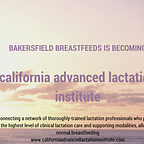Why Should You Pay for Lactation Education?
Why Should You Pay for Lactation Education?
If you work with moms and babies, you need to know how breastfeeding, or Normal Infant Feeding, works. If you don’t, you’re not going to be able to provide complete and ethical medical care to your patients. Lip service isn’t enough. Healthcare providers need to know enough about breastfeeding to be more than just cheerleaders — and if they don’t, they should know to whom their patients should be referred for assistance.
So why pay for more education if you are already a physician, nurse, dietitian, Occupational Therapist, or any other medical professional? The answer is simple: the education you received to prepare you for your profession did not include up-to-date information about breastfeeding, and some of what you learned may have even been influenced by the infant formula industry. Pediatricians, nurses, speech language pathologists, and more — we’ve heard from multiple healthcare specialties that they did not learn about breastfeeding during their training, and they are frustrated that the topic is not covered in any amount of useful detail. Without objective information from an International Board-Certified Lactation Consultant, you may not have heard the most complete information on how to support and educate new mothers on feeding choices.
Lactation education is monitored and vetted by the International Board of Lactation Consultant Examiners, the organization which is responsible for administering the board examination of potential IBCLC candidates. To qualify for the board exam, didactic education must be completed and supervised clinical hours documented and reviewed. Upon passing the board exam, the credential IBCLC is bestowed for a period of 5 years, after which re-certification is REQUIRED via continuing education or passing the board exam again. Compared to most healthcare credentials, that requirement is far more stringent and ensures that IBCLCs stay on top of their field’s emerging research and trends.
But what of the non-monetary value of such endeavors? Why should a healthcare provider pay for lactation education? The value to a new mother and her baby of having care provided by someone knowledgeable about breastfeeding is immensely underrrated. It is crucial that experts in lactation are available to all mothers to ensure they receive the highest level of breastfeeding care so that they are able to breastfeed for as long as possible. Breastfeeding reduces medical expenses in the long-term for both mothers and babies; this fact has been widely researched, calculated and reported.
One final thought: how many experts are really needed? Well, with the proliferation of complicating factors which confound the breastfeeding relationship, Western cultures truly do need as many lactation experts as possible. Maternal obesity and gestational diabetes, premature births, large numbers of labor inductions, a high rate of surgical births: among many others, these are factors which render breastfeeding difficult for many modern mothers. Factor in the lack of culutural awareness of appropriate expectations for human infants with a general lack of acceptance in Western cultures of breastfeeding anywhere outside a woman’s home, and there’s a recipe for multiple lactation issues. The bottom line is that babies are cheated when their mothers are unable to breastfeed them, and investing in lactation education advances our society’s ability to correct this injustice.
Christine Staricka, BS, IBCLC, RLC, CCE
www.bakersfieldbreastfeeds.com
christine@bakersfieldbreastfeeds.com
Creating a current curriculum is an endeavor which requires many work hours and many physical resources. Every hour of teaching requires approximately 3 hours of preparation for the first time it is taught. Updates to subsequent offerings of the same teaching can take 30–60 minutes each when factoring in applying newly published research and textbooks. Full references in APA style must be provided as part of every offering of lactation education. Presentation software is required to create a dynamic presentation for classes. Equipment on which to present material is a necessary expenditure. Printed materials are generally provided to participants in lactation education courses. Props such as cloth anatomical models, examples of feeding devices, and DVDs of relevant topics must be made available to provide the richest learning environment. In some cases, the facility in which a course is taught must be rented, meals are provided by the facilitators, and additional miscellaneous costs accumulate.
Providers of lactation education are verified to be current in their own education, and they are subject to high standards by the IBLCE. Remaining currently certified is not only mandatory, but subject to fees for licensure. These costs are borne by the IBCLC her/himself as part of the cost of doing business. Most IBCLCs have made significant, personal financial investments in their certification, and those costs are ongoing.
